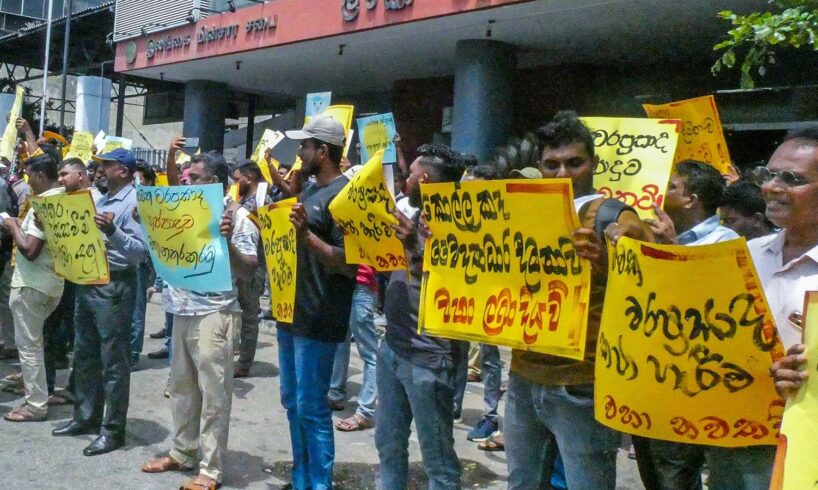
Around 16,000 Ceylon Electricity Board workers from the company’s 22,000-strong workforce took sick leave action on July 22 and held a one-day protest against the Sri Lankan government’s proposed Electricity (Amendment) Bill.
Electricity workers protesting outside CEB head office in Colombo, July 22, 2025
About 1,500 workers from across the island gathered outside the CEB headquarters in Colombo in a two-hour protest starting at 11:30 a.m. to oppose the proposed breakup of the CEB into multiple companies. The restructuring, which paves the way for privatisation, threatens their jobs and working conditions.
The action was organised by the All CEB Trade Unions Alliance, comprising 28 trade unions, including the CEB Sri Lanka Freedom Employees Union, CEB Technical Officers Union (CEBTOU), Client Coordinators Union, Technological Engineers and Superintendents Union, and Engineers Union. Members of the ruling Janatha Vimukthi Peramuna (JVP)-controlled All Ceylon Electricity Workers Union (ACEWU) defied their union leadership to join the protest.
According to the proposed bill, the CEB will be broken up into five separate companies under government control. These entities will be overseen by boards of directors appointed by the minister of power and energy. The bill stipulates that these five companies will be demerged into 12 additional entities after six months.
The bill makes no mention of workers’ rights during this transfer process, including matters related to salaries, allowances, loans, and medical benefits. This implies that existing employees’ rights will be discontinued and that the new companies will unilaterally determine salaries and working conditions. In other words, the government is preparing to unleash a sweeping assault on workers’ rights.
While the bill does not explicitly state this, the companies are expected to be transformed into public-private partnerships or fully privatised entities. This is in line with the International Monetary Fund’s (IMF) demands for the “restructure” of state-owned enterprises—dismantling previous nationalist protections—and their opening up to private investors.
While the electricity workers’ action is a clear expression of the growing working-class opposition to the JVP/NPP government’s IMF program, the trade union alliance restricted the protest to a handful of demands. It followed protest action by hundreds of teacher educators demanding a wage hike on July 15, and strike action by railway employees calling for promotions on July 5.
One of the demands made by the All CEB Trade Unions Alliance was to call on the government to comply with a Supreme Court (SC) ruling on the bill. The trade unions had previously petitioned the court, arguing that certain articles violated the fundamental rights of employees.
The higher court ruled that because the bill made no mention of the rights of employees being transferred to new companies, these protections had to be included. It also directed that company directors be held accountable under the Anti-Corruption Act.
The court also determined that provisions violating fundamental rights must either be amended or passed with a two-thirds parliamentary majority, or a referendum.
A second parliamentary reading of the bill was scheduled for July 24 but postponed because it contained technical errors.
Claims by CEB union leaders that the court ruling protects workers’ rights is a myth. The court’s decisions are entirely within the framework of IMF-backed restructuring.
Union officials have called on the government to sign a collective agreement during the implementation of the changes and similar to that made when the CEB was founded in 1969. None of the CEB union leaders opposes the IMF-imposed restructuring; all they want is a seat at the table and a role in collaborating with company directors in developing a new collective agreement.
About 400 state-owned enterprises are slated for restructuring under the terms of the $US3 billion IMF bailout agreement signed under former President Ranil Wickremesinghe in 2023. That government passed a bill last August proposing the division of the CEB into 11 companies. The CEB is the first of 12 state enterprises marked for “immediate reform.”
During last year’s presidential and parliamentary election campaigns, the JVP and its trade union bureaucrats falsely claimed to oppose to Wickremesinghe’s Electricity Act and pledged to introduce a new act to safeguard workers’ rights. Like many other promises, this has been ditched.
In fact, the JVP/National People’s Power government has imposed an unofficial ban on all strikes and protests by trade unions under its control, not just within the CEB.
The JVP-controlled ACEWU played a key role in strangling workers’ opposition. For over a decade, its leader, Ranjan Jayalal, who is a JVP central committee member, has systematically worked to limit and suppress workers’ struggles. Following the recent local government elections, he was rewarded with the post of mayor of Kaduwela Municipal Council in the Colombo suburbs in recognition of his loyal service.
During last Tuesday’s protest, CEBTOU general secretary Prabhath Priyantha told the media that the unions were calling on the government “not to inconvenience the people and to come to a negotiated settlement.” He warned with a hollow threat that if the government did not respond, trade union action taken after July 23 “would be serious.”
He ended his speech, however, by supporting the government’s policies and stating that the protest was “not an anti-government struggle, or a fight to inconvenience the government, or a demand to roll back the act.”
The opposite is the case. Workers confront a direct political struggle against the Dissanayake government and its IMF-dictated restructuring of state-owned enterprises and their future privatisation. Unless workers fight to defeat this broader agenda, they cannot defend their rights.
Over the past two years, CEB workers walked out on strike and demonstrated against the Wickremesinghe government’s austerity measures. In January last year, 62 CEB employees were suspended in a major government crackdown. The current union leadership, including those from JVP-affiliated unions, did all they could dampen down these struggles, promoting illusions that Wickremesinghe could be pressured into reversing his policies and by campaigning to bring the current government to power.
While the Dissanayake government has reinstated some of the suspended workers, but under harsh conditions, it is launching an even deeper attack through its breakup of the CEB. This restructuring is not just aimed at privatisation but dismantling the unified strength of the workforce.
The Socialist Equality Party (SEP) and the Collective of Workers Action Committees in Sri Lanka (CAC) have intervened in the struggles of CEB workers and presented an alternative program to defend their rights. As the World Socialist Web Site warned on March 25, 2024:
In opposition to the reactionary efforts of the trade union bureaucracies to politically tie the CEB and other state sector workers to the NPP and other bourgeois opposition parties, the SEP and Collective of Workers Action Committees urges workers to organise independently of these pro-capitalist formations.
In order to defeat the Wickremesinghe government’s austerity measures and its anti-democratic attacks, workers must take matters into their own hands. This means forming democratically controlled action committees in every workplace, the plantations and other major economic centres. Trade union bureaucrats, capitalist parties and their hangers-on will not be admitted.
The working class and the oppressed masses can only defend their democratic and social rights in a political and industrial struggle to bring down the Wickremesinghe government and its IMF measures.
The necessity for this program has now been vindicated. We urge CEB workers to join this struggle without delay.
Sign up for the WSWS email newsletter





